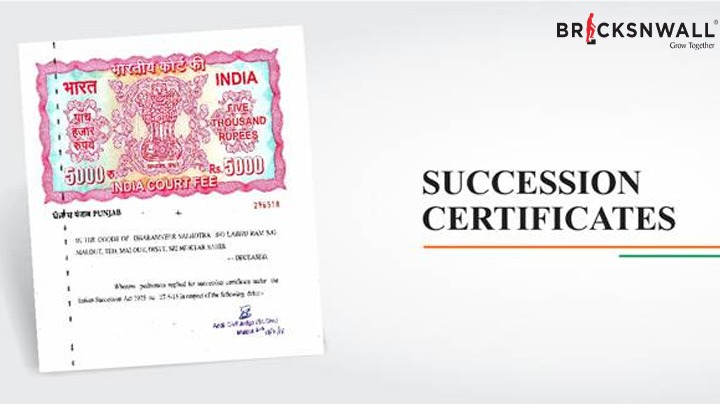What is a Succession Certificate?
Bricksnwall Trusted Experts

In this
blog, we will explore the concept of a succession certificate in detail and
discuss its importance and the process of obtaining it.
A succession
certificate is a legal document that establishes the legal heirs of a deceased
person and authorizes them to claim the assets left by the deceased person. It
is a judicial decree granted by a court of law, usually a district court, and
is issued to the heirs of the deceased person after they have proved their
legal entitlement to the assets. The certificate is issued in accordance with
the applicable succession laws, which vary depending on the religion and
personal law of the deceased person.
The
certificate serves as proof of the legal heirs' entitlement to the deceased
person's assets and can be used to claim various types of assets, including
bank accounts, shares, insurance policies, and other movable and immovable
properties. Without a succession certificate, the legal heirs of a deceased
person may face difficulties in claiming their rightful share of the assets and
may even face legal disputes with other claimants.
Importance
and Process of Obtaining a Succession Certificate
The
importance of a succession certificate lies in its ability to establish the
legal heirs of a deceased person and give them the right to claim the assets
left by the deceased person. Without a succession certificate, the legal heirs
may face various difficulties, such as delays in accessing the assets, disputes
with other claimants, and even legal proceedings. Therefore, it is important
for the legal heirs to obtain a succession certificate as soon as possible
after the death of the deceased person.
The process
of obtaining a succession certificate involves several steps and can be a
lengthy and complicated process. The legal heirs must first file a petition in
the district court or other competent court, along with the necessary
documents, such as the death certificate of the deceased person, proof of their
legal entitlement to the assets, and other relevant documents.
Once the
petition is filed, the court will issue notices to all interested parties,
including other claimants and creditors, and will conduct a hearing to
determine the legal heirs of the deceased person. The court may also require
the legal heirs to provide further evidence or documentation to establish their
claim to the assets.
If the court
is satisfied with the legal heirs' claim, it will issue a succession
certificate in their favor, which they can use to claim the assets from the
relevant authorities or institutions. The certificate is valid throughout India
and can be used to claim assets located in any part of the country.
In conclusion, a succession certificate is an important legal document that establishes the legal heirs of a deceased person and gives them the right to claim the assets left by the deceased person. It is a judicial decree granted by a court of law and is issued in accordance with the applicable succession laws. The importance of a succession certificate lies in its ability to establish the legal heirs' entitlement to the assets and to prevent legal disputes and delays in accessing the assets. The process of obtaining a succession certificate can be lengthy and complicated, but it is a necessary step for the legal heirs to protect their rights and claim their rightful share of the assets.




